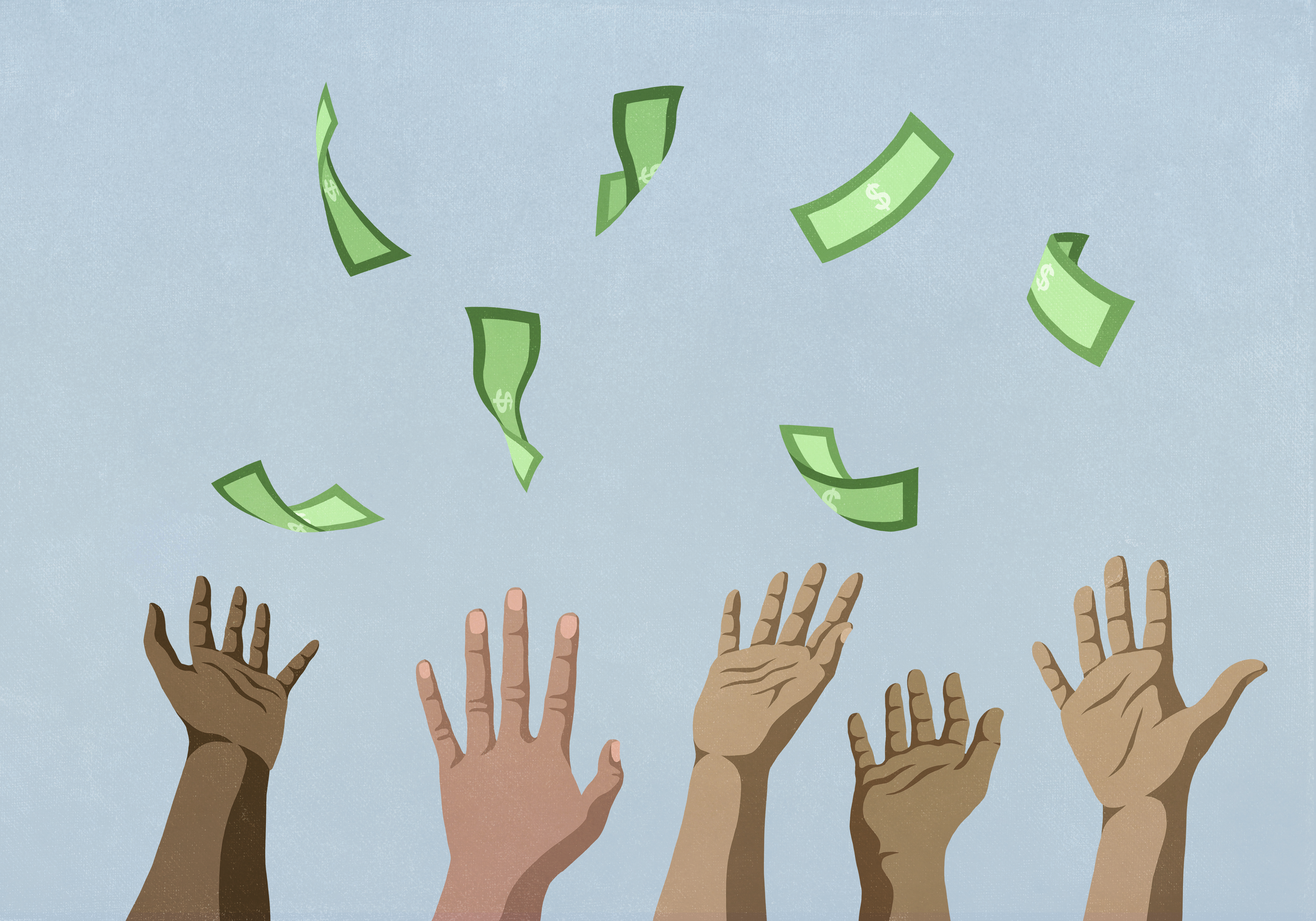What is 'lifestyle inflation' and how does it limit wealth?
More money, more problems? Not necessarily.


A free daily email with the biggest news stories of the day – and the best features from TheWeek.com
You are now subscribed
Your newsletter sign-up was successful

As your income grows, it's easy to let your spending grow with it. You dish out a little more here and a little more there — a bigger apartment, more meals out, an additional vacation or two. This is known as "lifestyle inflation," and while it may seem innocuous, it can have major financial implications. It is a major roadblock to building wealth and can keep you living paycheck to paycheck — even when those paychecks are much larger than they used to be.
The first step in keeping lifestyle inflation from limiting your saving potential is to know how to identify whether you've fallen victim to it. From there, consider incorporating some strategies to avoid it, so you're not trading short-term enjoyment for long-term financial success.
What is lifestyle inflation exactly?
Also known as lifestyle creep, lifestyle inflation is the phenomenon in which a person's spending goes up every time their income increases. In other words, as you're earning more each month, you're also spending more, whether on living expenses, travel, dining out, entertainment, or shopping.
The Week
Escape your echo chamber. Get the facts behind the news, plus analysis from multiple perspectives.

Sign up for The Week's Free Newsletters
From our morning news briefing to a weekly Good News Newsletter, get the best of The Week delivered directly to your inbox.
From our morning news briefing to a weekly Good News Newsletter, get the best of The Week delivered directly to your inbox.
According to Insider, lifestyle inflation can also occur when someone pays off a loan. After their loan is paid off — whether that's a car loan, student loan debt, or a mortgage — they spend the money that was going toward monthly loan payments rather than saving or investing it. "I have seen clients who make more money actually make their financial plans look worse because of lifestyle creep," Clint Camua, regional director and partner at EP Wealth Advisors, tells Insider.
As an example, let's say that after graduating from college you landed an entry-level role that offered an annual salary of $45,000. After a year of hard work, you get a promotion and secure a major pay raise, bumping your annual salary to $60,000. Before, you'd limited yourself to eating out on special occasions, but now you regularly grab takeout for lunch and make reservations at restaurants for dinner. You decide to move out of your shared space with roommates and get a more expensive studio apartment solo. Meanwhile, despite your pay raise, your deposits into your savings account and retirement plan have remained the same because you have little leftover at the end of each month to stash away.
Why is lifestyle inflation a red flag?
"The more you choose to spend today, the less financial freedom you may have down the road," Kiplinger says. Building significant wealth requires saving and investing a substantial chunk of the amount of money you bring in. That won't be possible if there isn't a gap between your earnings and your spending.
It's not that you can't make any improvements or upgrades when your income increases. Sometimes, spending a little more can improve your quality of life, or be necessary as your life changes and, say, you get married or have a family.
A free daily email with the biggest news stories of the day – and the best features from TheWeek.com
Lifestyle creep becomes a problem when it's eating up such a large chunk of your income that you can't afford to ramp up your savings in tandem with your earnings boost. At that point, your spending habits might impede on your ability to save adequately for retirement, keep a fully stocked emergency fund, or even pay down debt.
What are some telltale signs of lifestyle inflation?
So, how can you tell if it's lifestyle inflation? Here are some signs to look out for, per Insider:
- The amount you're saving isn't going up. If your income has increased significantly, so should the amount you're putting toward savings. A major red flag of lifestyle creep is if this amount has stayed more or less the same, despite jumps in income. "Not prioritizing saving can be disastrous for your overall financial health," Insider says.
- Your spending has gone up in most areas. This is how you can spot the difference between strategic improvements in your life — such as a better apartment or a more reliable car — as opposed to just spending more across the board.
- You don't have a strong handle on your finances. Let's say you've thrown caution about your budget to the wind, confident you now have plenty of money to cover whatever expenses life brings your way. Or you're noticing that your bank account balance is consistently declining and your credit card balance keeps on climbing. If you have a bad feeling whenever you check in financially, that guilt might be a sign something is amiss.
What are some strategies for avoiding lifestyle inflation?
Avoiding lifestyle inflation is crucial if you're serious about building wealth and securing your financial future. But you don't have to go to the other extreme and deprive yourself. "This isn't about nitpicking your expense," says Kiplinger. "It's more about big-picture choices — meaning major lifestyle decisions like where you live and what kind of car you drive, not whether you buy your lunch out a few times a week at work."
With that in mind, here are some steps you can take to ensure lifestyle inflation doesn't eclipse your growing income:
- Think hard about taking on additional fixed expenses. Those additions aren't going anywhere any time soon, and "they tend to give you no way out if you need one," says Kiplinger.
- Keep changes to your spending gradual. One piece of advice that Investopedia offers: "Don't make huge changes to your lifestyle in the first few weeks; instead, celebrate modestly." Once the excitement of a boost in income wears off, you can more clearly assess any potential shifts and how those will change your budget.
- Interrupt the urge on impulse purchases. With more money at your disposal, it might feel easier to buy something that catches your eye, even if it isn't something you necessarily need or had planned to purchase. One strategy is to create a wishlist of items you want. "Put the items you desire on a list," says NPR. "Then, after a predetermined time (like a week or a month), if you still want that thing, go ahead and buy it." The process of making a list replicates the feeling of shopping, but without the financial commitment.
- Make a plan for your money — and then stick to it. Another tried and true way to keep your spending in check and your savings on track is to set a budget. That way, you know where your money is going each month and how much you want to allot to savings vs. spending. This can also allow you to assess your financial goals and make sure you're acting accordingly, putting saving and paying down debt at the top of the list.
Accurately calculating how much you're allowed to spend is really important to prevent lifestyle creep. As Kiplinger puts it, "[t]here's a line between spending carelessly that puts you at risk of running out of money in the future and squirreling away so much money that you face a different type of risk: not truly living while you have the chance."
Becca Stanek has worked as an editor and writer in the personal finance space since 2017. She has previously served as the managing editor for investing and savings content at LendingTree, an editor at SmartAsset and a staff writer for The Week. This article is in part based on information first published on The Week's sister site, Kiplinger.com
New Tax Rules for 2023: Download your free issue of The Kiplinger Tax Letter today. No information is required from you.
Becca Stanek has worked as an editor and writer in the personal finance space since 2017. She previously served as a deputy editor and later a managing editor overseeing investing and savings content at LendingTree and as an editor at the financial startup SmartAsset, where she focused on retirement- and financial-adviser-related content. Before that, Becca was a staff writer at The Week, primarily contributing to Speed Reads.
-
 What are the best investments for beginners?
What are the best investments for beginners?The Explainer Stocks and ETFs and bonds, oh my
-
 What to know before filing your own taxes for the first time
What to know before filing your own taxes for the first timethe explainer Tackle this financial milestone with confidence
-
 The biggest box office flops of the 21st century
The biggest box office flops of the 21st centuryin depth Unnecessary remakes and turgid, expensive CGI-fests highlight this list of these most notorious box-office losers
-
 How your household budget could look in 2026
How your household budget could look in 2026The Explainer The government is trying to balance the nation’s books but energy bills and the cost of food could impact your finances
-
 What is a bubble? Understanding the financial term.
What is a bubble? Understanding the financial term.the explainer An AI bubble burst could be looming
-
 The FIRE movement catches on as people want to retire early
The FIRE movement catches on as people want to retire earlyIn the spotlight Many are taking steps to leave the workforce sooner than usual
-
 Who wants to be a millionaire? The dark side of lottery wins
Who wants to be a millionaire? The dark side of lottery winsIn The Spotlight Is hitting the jackpot a dream come true or actually a nightmare?
-
 How can you find a financial adviser you trust?
How can you find a financial adviser you trust?the explainer Four ways to detect professionals who will act in your best interest
-
 With economic uncertainty, 2025 looks to be a 'No Buy' year
With economic uncertainty, 2025 looks to be a 'No Buy' yearIn the spotlight Consumers are cutting back on splurges to combat overconsumption
-
 3 tips to lower your household bills
3 tips to lower your household billsThe Explainer Prices on everything from eggs to auto insurance to rent have increased — but there are ways to make your bills more manageable
-
 What should you consider when choosing a financial adviser?
What should you consider when choosing a financial adviser?The Explainer The right person can be a big help with financial planning, investing, taxes and more
